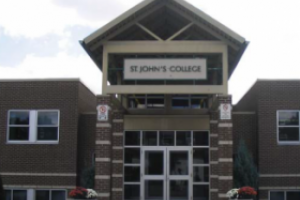Science
Introduction
Our science courses use a wide variety of hands-on activities to engage and reinforce learned concepts throughout the course. Grade 9 science covers a diverse range of scientific topics that look at real world applications in a fun, informative way. Interesting chemistry experiments and demos explaining the properties of matter will change the way students look at everything around us. They will also learn about static and current electricity using the Van De Graaff generator and building electrical circuits.
Students will be better able to understand ecosystems and our impacts on them by examining populations at risk, creating a sustainable ecosystem, and debating about the future of renewable and non-renewable energies. Students will also get to explore what lies beyond our earth – discussing how modern exploration of the universe is leading to great discoveries, and how star formations can be used as time keeping devices, and so much more! We offer programing at the locally developed, applied and academic levels for our junior courses, and workplace, college and university levels for our senior courses.
We are also proud to offer Advanced Placement courses in Biology and Chemistry, as well as pre-Advanced Placement classes at the Grade 10 and Grade 11 levels.
For students who enjoy learning even more about science, they can participate in our STEM (Science, Technology, Engineering, and Mathematics) club, where different activities range from having fun with dry ice, to guest speakers and field trips. Come explore the world around you and start your inquisitive learning journey at SJC!
Course Descriptions
Science, Grade 9, De-streamed (SNC1W1)
This course enables students to develop their understanding of concepts related to biology, chemistry, physics, and earth and space science, and to relate science to technology, society, and the environment. Throughout the course, students will develop and refine their STEM skills as they use scientific research, scientific experimentation, and engineering design processes to investigate concepts and apply their knowledge in situations that are relevant to their lives and communities. Students will continue to develop transferable skills as they become scientifically literate global citizens.
In this course students will:
- Cover a wide variety of scientific topics that look at real world applications in a fun, informative way
- Perform interesting chemistry experiments and demos explaining properties of the matter
- Learn about static and current electricity through hands on activities, such as building circuits
- Use a variety of activities to understand ecosystems and our effects on them
- Discuss the study of space: the universe, exoplanets, and star formation
Science, Grade 9, Locally Developed (SNC1L1)
This is an introductory course in science that will allow you to learn about the basic concepts involved in biology, chemistry, physics and scientific inquiry. Each of these topics explore a range of topics including life-sustaining processes in simple and complex organisms, properties of common materials, electrical circuits and science in daily life. The course is designed to help you develop your mathematical and scientific process skills and to continue developing your skills in reading, writing and oral language through practical and relevant science activities. You will be asked to design and conduct investigations related to the 4 topics of study allowing you to put your practical problem solving abilities to use and to apply your knowledge of science to everyday situations. This course will provide you with considerable knowledge in science and prepare you for the next level of study and success in everyday life. If you wish to continue study science this course prepares you for the Grade 11 Workplace Preparation course.
In this course students will:
- Broaden their knowledge and understanding of the basic concepts in biology, chemistry, and physics through a variety of hands-on activities
- Develop practical skills in scientific investigation and apply their knowledge and skills to everyday situations
- Perform experiments discovering properties of common materials, dissections looking at life-sustaining processes in simple and complex organisms, and build electrical circuits







